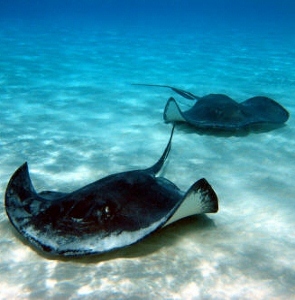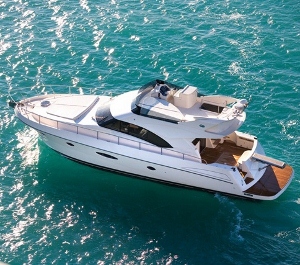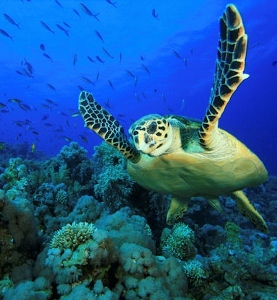Archive for September 25th, 2012

CITA calls for stingray laws
 (CNS): The body which represents members of the tourism sector has called for changes to the marine conservation law to ensure the protection of stingrays in local waters. Thecall comes in the wake of news that four of the ten stingrays at a local captive dolphin facility had been taken from the population of rays at the Sandbar. The Cayman Islands Tourism Association (CITA) said that a recent survey of the declining numbers at Stingray City and the Sandbar is cause for concern and Cayman could lose its biggest national tourism asset if something is not done. Backing the currently shelved National Conservation Law, the association called on government to do something to protect all local fragile species.
(CNS): The body which represents members of the tourism sector has called for changes to the marine conservation law to ensure the protection of stingrays in local waters. Thecall comes in the wake of news that four of the ten stingrays at a local captive dolphin facility had been taken from the population of rays at the Sandbar. The Cayman Islands Tourism Association (CITA) said that a recent survey of the declining numbers at Stingray City and the Sandbar is cause for concern and Cayman could lose its biggest national tourism asset if something is not done. Backing the currently shelved National Conservation Law, the association called on government to do something to protect all local fragile species.
“The CITA supports the adoption of the long debated and long awaited National Conservation Law and immediately calls on government to enact legislation to protect southern stingrays,” CITA stated in a release on Tuesday. “Many local indigenous creatures — both land and sea — need protection, and CITA insists that the proper laws must be enacted and enforced to protect the fragile and important life forms that make Cayman their home.”
Focusing on the local population of wild stingrays, CITA noted that the limited protection the rays while swimming in the designated Wildlife Interaction Zones (WIZ) of Stingray City the Sandbar are insufficient as there is no legislation to prevent the removal of stingrays from locations outside the WIZ or other protected areas.
“Over the last three years, watersports operators have seen an alarming reduction in the populations of southern stingrays at both Stingray City and Stingray Sandbar. A recent survey of the stingray population by biologists confirms this observation,” CITA stated, adding that new regulations to the Marine Conservation Law must be added to include southern stingrays as a protected species.
“The Cayman Islands are world famous for many things, and for many visitors, it is the southern stingrays that are one of the most well-known images associated with the Cayman Islands. In fact, because of its success, many competing destinations around the globe have tried to copy Stingray City. CITA’s watersports members feel that if these stingrays are not protected, the Cayman Islands stand to lose its biggest national tourism asset,” the tourism body said as it pointed to the thousands of jobs and hundreds of businesses dependent on a healthy population of rays.
CITA estimated that revenues from Stingray City and the Sandbar exceed US$30,000,000 per year, not including revenues generated by other activities by the same visitors.
“Many of the stingrays in the WIZ areas have been 'entertaining' visitors and locals alike for many years and therefore can certainly be considered 'million dollar rays',” the organisation noted about the species, which despite that value remains vulnerable and unprotected by legislation.

Boat owners face tenfold fee increase
 (CNS): Updated – Owners of large boats and luxury yachts registered with the Port Authority will be paying ten times more tax on their vessels as a result of the fee increases in the 2012/13 budget. The licence for local boats (those normally operating in Cayman waters) exceeding 100 feet will now cost their owners $10,000 per year, up from $1000, which was the old fee for all vessels over 70 feet. According to the amended regulations, which have now been published, the fees begin on boats over 30 feet but fees for smaller boats remain the same. The amended fees under the new Port regulations do not apply to yachts registered under the Merchant Shipping Law unless locally owned and operating in Cayman territorial waters.
(CNS): Updated – Owners of large boats and luxury yachts registered with the Port Authority will be paying ten times more tax on their vessels as a result of the fee increases in the 2012/13 budget. The licence for local boats (those normally operating in Cayman waters) exceeding 100 feet will now cost their owners $10,000 per year, up from $1000, which was the old fee for all vessels over 70 feet. According to the amended regulations, which have now been published, the fees begin on boats over 30 feet but fees for smaller boats remain the same. The amended fees under the new Port regulations do not apply to yachts registered under the Merchant Shipping Law unless locally owned and operating in Cayman territorial waters.
Local boats under 21 feet are not taxed and owners are not required to pay a fee. Government has also chosen not to tax private wave runners and jet skis though owners renting these types of craft will pay $150 fee.
Vessels over 30 feet and under 40 feet will now attract a fee of $1,000 per annum, up from $300 in the previous regulations.
Boats over 40 but under 50 feet will go up from $300 to $2,000, while those between 51 and 60 feet will increase from $500 to $3,000.
Vessels exceeding 61 feet but and 70 feet will pay $4,000 instead of $500 and those over 70 feet will now cost their owners $5,000 per year.
Boats over 80 feet will be $6,000 and over 90 feet $7,000, with the vessels exceeding 100 feet now attracting a whopping annual license fee of $10,000.
See amended regulations below.

Cops start zero tolerance
 (CNS): With sufficient warnings about the new traffic law, which was implemented on Friday, the police say they will now be enforcing a zero tolerance policy on road offences introduced or reinforced in the new law. From motorists who text or use phones without a hands-free set to those splashing pedestrians when carelessly driving on wet roads, cops will be ticketing all rogue drivers. The new traffic regulations came into effect on 21 September heralding the long awaited traffic law passed in November. and police were out in force on Friday checking and collecting data regarding traffic offences, in particular making sure that drivers were aware of the new rules regarding phones.
(CNS): With sufficient warnings about the new traffic law, which was implemented on Friday, the police say they will now be enforcing a zero tolerance policy on road offences introduced or reinforced in the new law. From motorists who text or use phones without a hands-free set to those splashing pedestrians when carelessly driving on wet roads, cops will be ticketing all rogue drivers. The new traffic regulations came into effect on 21 September heralding the long awaited traffic law passed in November. and police were out in force on Friday checking and collecting data regarding traffic offences, in particular making sure that drivers were aware of the new rules regarding phones.
Superintendent Adrian Seales said police were encouraged that the majority of people seem to be adhering to the law by either using hands-free kits or not using the cell phones at all.
“It's clear that the education we have carried out with our partners in other agencies, the media and cell phone companies has, so far, been relatively successful. However, be assured that we will continue to rigorously enforce the law and target those who fail to abide by it," he added.
Police said Monday that just one person has received a ticket for talking on their phone while driving without a hands-free set.
Alongside the partial mobile phone ban in the car, amendments to the law to introduce careless driving could even see motorists significantly out of pocket for splashing pedestrians in wet weather.
“If someone drives through a puddle and splashes someone they can be charged with careless driving,” Seales said. “If the person goes to court, obviously it is left to the magistrate to levy a fine and it could be as much as $500.”
Other offences that fall under careless driving include using hazards when not in an emergency situation or driving with the full beam or high beam when other motorists are approaching. Although police say towing and impounding vehicles will be a last resort, they will be clamping down and ticketing illegal parkers.
Meanwhile, the 2012 edition of the new road code for the Cayman Islands is available from the all of Department of Vehicle & Drivers' Licensing (DVDL) locations on Grand Cayman and Cayman Brac.
"In addition to being bigger, the new Road Code has more detailed descriptions and is a more comprehensive guide of what is expected of road users,” said DVDL Deputy Director Richard Simms.
The 2012 Edition provides illustrations on how to navigate a roundabout, has updated signage and describes how all road users should conduct themselves, including horse riders, people who walk their dogs, pedestrians and cyclists.
For more information go to dvdl.gov.ky or call 945-8344. DVDL has two locations on Grand Cayman: Crewe Road DVDL Headquarters. Opening hours: 8:30 a.m. to 4:00p.m., Monday to Friday. Banks Plaza West Bay: 10:00 a.m. to 6:00 p.m., Tuesday to Friday and 9:00 a.m. to 4:00 p.m., Saturday. Cayman Brac: District Administration Building Opening hours: 8:30 a.m. to 4:00 p.m., Monday to Friday.

Marine creatures will head north as climate changes
 (CNS): Scientists are predicting major shifts in ocean ecosystems within the next 90 years as a result of climate change. A new study published in Nature Climate Change looks as the distribution of various open ocean animals in the North Pacific and explores how that could change over the next century as global sea temperatures increase and productivity levels shift. The researchers found that some critical ocean habitats could undergo significant changes in location, moving more than 600 miles from where they are now, while other habitats could remain relatively unchanged.
(CNS): Scientists are predicting major shifts in ocean ecosystems within the next 90 years as a result of climate change. A new study published in Nature Climate Change looks as the distribution of various open ocean animals in the North Pacific and explores how that could change over the next century as global sea temperatures increase and productivity levels shift. The researchers found that some critical ocean habitats could undergo significant changes in location, moving more than 600 miles from where they are now, while other habitats could remain relatively unchanged.
Loggerhead turtles, sharks and blue whales may face the harshest impacts of climate change while some seabirds may actually benefit. Not only are species at risk, but coastal communities and industries could feel the impact since top predator habitat shifts can result in the displacement of fisheries and ecotourism.
"For species already stressed by overfishing or other human impacts, increased migration time and loss of habitat could be a heavy blow," said Elliott Hazen, a National Oceanic and Atmospheric Administration researcher on the project who is affiliated with the Center for Ocean Solutions at Stanford university, according to the college news.
"But if we can build some plausible scenarios of how marine ecosystems may change, this may help efforts to prioritize and proactively manage them."
See full study here